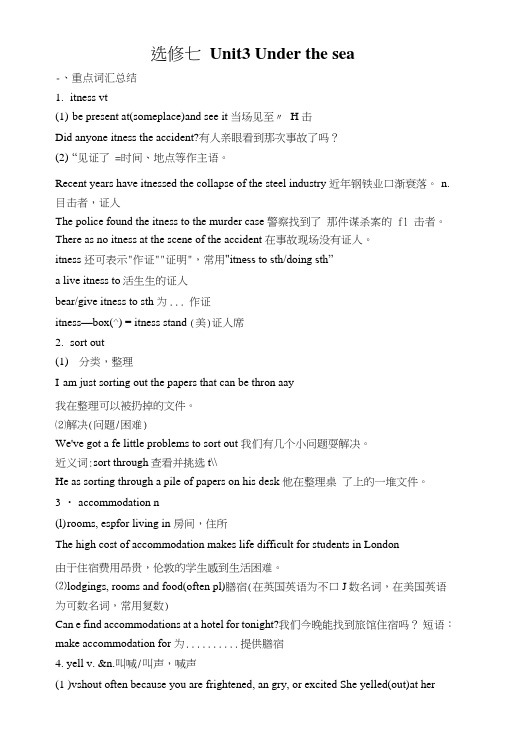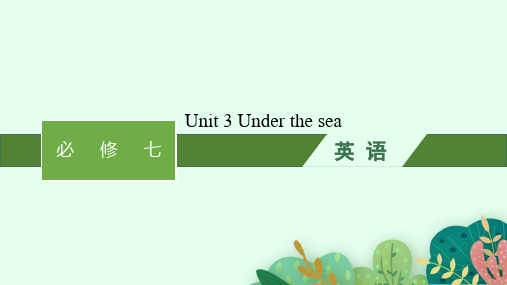人教版高中英语选修七Unit3Underthesea知识讲解被动语态复习2
人教版高中英语选修7教案Unit3UndertheSea

人教版高中英语选修7教案Unit3UndertheSea人教版高中英语选修7教案Unit 3 Under the Sea Unit 3 Under the Sea一、语言要点I单元要点预览(旨在让同学整体了解本单元要点)词汇部分词语辨析1shre/seaside/beah/ast/ban 2flee/esape 3 deep/deepl 词形变化1 depth n 深, 深度,deepl adv深深地deep ad&ap adv 深的;深入地,2 nserve v 保存, 保藏nservatin v 保存, 保持3vivid ad 生动的, 鲜明的, 活泼的vividl adv 生动地, 鲜明地4 aese ad 引起敬畏的, 可怕的ae n 敬畏ae vt敬畏tast ad 好吃的, 可口的taste v品尝;n味道, 味觉tasteless ad 没味道的, 无鉴赏力的重点单词1 annual ad 每年的;按年度计算的/ n 年刊;年鉴2 itness n 目击者;证人;证据vt 当场见到;目击3 adatin n 住所4 abandn vt 放弃;遗弃;抛弃reflet vt 映射;反射vi &ap vt 思考6 aare ad 意识到的;知道的7 sare vt 恐吓vi 受惊吓重点词组srt ut整理;挑出help ut 帮助……(摆脱困难或危难);协助;使……脱离困境thr neself ut f 跃出upside dn上下翻转过重点句型1 It as a tie h en the iller hales, r “illers” as the ere then alled, helped the halers ath the baleen hales that ere n their annual igratin2 I had alread heard that Gerge didn’t lie being ept aiting, s even thugh Ididn’t have the right lthes n, raed after hi3 I’sittin g in the ar night air ith a ld drin in hand and refleting n the da-a da f pure agi!重点语法被动语态(II)(见语法专题)II 词语辨析(旨在提供完形填空所需材料)1) shre/seaside/beah/ast/ban n海边,海岸【解释】shre 指海岸,湖岸,也指近海的一带。
人教版高中英语选修七Unit3Underthesea知识点总结.doc

选修七Unit3 Under the sea-、重点词汇总结1.itness vt(1)be present at(someplace)and see it 当场见至〃H 击Did anyone itness the accident?有人亲眼看到那次事故了吗?(2)“见证了 =时间、地点等作主语。
Recent years have itnessed the collapse of the steel industry 近年钢铁业口渐衰落。
n.目击者,证人The police found the itness to the murder case 警察找到了那件谋杀案的 fl 击者。
There as no itness at the scene of the accident 在事故现场没有证人。
itness 还可表示"作证""证明",常用"itness to sth/doing sth”a live itness to活生生的证人bear/give itness to sth 为... 作证itness—box(^) = itness stand (美)证人席2.sort out(1)分类,整理I am just sorting out the papers that can be thron aay我在整理可以被扔掉的文件。
⑵解决(问题/困难)We've got a fe little problems to sort out 我们有几个小问题耍解决。
近义词:sort through查看并挑选t\\He as sorting through a pile of papers on his desk 他在整理桌了上的一堆文件。
3 ・ accommodation n(l)r ooms, espfor living in 房间,住所The high cost of accommodation makes life difficult for students in London由于住宿费用昂贵,伦敦的学生感到生活困难。
Underthesea语法讲解(新人教版选修7unit3)

Under the sea同步素材(新人教版选修7 unit 3)V-ing形式的被动语态要点归纳1. V-ing形式的主动语态表示主动的意义,被动语态表示被动的意义。
如果V-ing形式的逻辑主语是动作的承受者,要用V-ing形式的被动式。
如:He remembered having seen the film. 他记得曾经看过这部电影。
(“He”是“记得”的执行者,故用V-ing形式的主动式作宾语)No one likes being laughed at. 没有人喜欢被嘲笑。
(主语“No one”是“嘲笑”之动作的承受者,故用V-ing形式的被动式作宾语)The building being built there will be a new bookstore. 正在兴建的那座房屋将是一家新书店。
(“building”是“兴建”之动作的承受者,故用被动式作定语)2. V-ing形式的被动语态的一般时既可表示一个被动的动作正在发生,也可表示该动作与谓语动词表示的动作同时发生。
如:He was afraid of being scolded by the teacher. 他害怕被老师责骂。
(指一时或经常性的情况)The truck being repaired there is ours. 正在那里维修的那辆卡车是我们的。
(being repaired作定语,强调正在发生的被动动作)3. V-ing形式的被动语态的完成时表示一个被动的动作发生在谓语动词表示的动作之前。
如:Having been married sixty years, they still love each other. 他们已经结婚六十年了,仍然相爱。
(“结婚”这个动作发生在“still love”之前)Having been told many times, he still made the same mistake. 尽管已经跟他说了很多次,他仍然犯同样的错误。
最新高中英语选修7 unit3 under the sea语法演示教学

①动词-ing一般时和一般时的被动形式
(1) He hurried home,looking behindfrom time to time.
(2) The buildingbeing repairedis ourdormitory.
②动词-ing的完成时和完成时的被动形式
(1)Having heardthis, our teacher expressed her satisfaction.
当动词-ing形式的逻辑主语是动作的承受者时,就要用动词-ing形式的被动语态。动词-ing形式的被动语态和它的主动语态一样,在句中可以作主语、表语、宾语、宾语补足语、定语、状语,但不能单独作谓语。其完成式多在句中作状语。
3、动词-ing形式的被动式的句法功能
(1)用作主语
E.g.①Being killed by sharks in the sea is a common thing.
②Being helped out by the killerwhales, the whalers were able to make successful kill.
★______ to sunlight for too much time will do harm to one’s skin. (上海高考题2002)
=The flowers in the garden want to be watered.花园里的花需要浇水了。
②The blackboard needs cleaning.
= The blackboard needs to be cleaned.黑板需要擦干净。
2)在(be)worth后面只能用动名词的主动态来表示被动意义。
高中英语Unit3复习被动语态Ⅱ课件新人教版选修7

4.The meeting was put off without _h_i_s_h_a_v_in_g__b_e_e_n_c_o_n_s_u_lt_ed__ (咨询他).
5.She was very upset for ____n_o_t_h_a_v_in_g__b_ee_n__in_v_i_te_d____ (没被 邀请) to the party.
anxious sometimes. 10.However, a plan can bear no fruit without _b_e_i_n_g_c_a_rr_i_ed____
(carry) out.
Ⅱ.补全句子(注意使用被动语态) 1.As a student, I can tell you that there is nothing better than _b_e_in_g__p_ra_i_se_d__b_y__ (被……表扬) my teacher before my classmates. 2.Every time I read “...if I had the power of sight for three days”, I cannot help __b_e_in_g__m_o_v_e_d____ (被感动) by its author Helen Keller. 3.___H_a_v_in_g__b_e_en__c_ri_ti_c_iz_e_d____ (被批评) by the teacher, Li Ming gave up smoking.
Unit 3
Under the sea
Section Ⅲ Grammar——复习被动语态(Ⅱ)
01 课前自主领悟
02 课后训练
课时作业
01 课前自主领悟
最新高中英语选修7 unit3 under the sea语法资料讲解

Book1Unit (1-5)1.调查;测验___________2 add up _____________3.upset ____________4.不理睬;忽视__________5.calm(…)down _______6.have got to _______7.be concerned about________8.loose _________9.go through___________10.set down___________11.a series of ____________12.在户外;在野____________13.on purpose____________14.in order to ____________15.at dusk ________________16打雷;雷鸣_________17.电梯;升降机__________18.petrol_____________19.官方的;正式的;_________20.voyage n. __________21.conquer ___________22.because of _________23.native __________24.走近;上来;提出_________25.apartment __________26.实际上;事实上__________27.at present____________28.逐渐地;逐步地__________29使富裕;充实__________30.词汇;词汇量____________31.利用;使用______________32.拼写;拼法___________33.(两者中)后者___________34.本身;本体;身___________35.流利地;流畅___________36.毕业,大学毕业生___________37.最后;终于___________38.时间表;进度表___________39.be fond of ___________40.缺点___________41.顽固的;固执的___________42.组织;成立___________43.关心;忧虑;惦念___________44.细节;详情___________45.来源;水源___________46.determined___________47.改变主意. ___________48旅行;旅程___________49.altitude n. ___________50.下决心;决定___________51.投降;屈服;让步___________52.atlas___________53冰河;冰川___________54.rapids ___________55.valley ___________56.瀑布___________57.弯身;弯腰__________58.entirely ____________59.power __________-60.face to face ________61.窗帘;门帘___________62.积满灰尘的__________-63.不再……____________64.使定居;安排;_________65.suffer from ____________66.孤单;寂寞____________67.highway _______________68.痊愈;恢复_____________;69.get/be tired of ___________70.态度;看法___________71.预测;预报___________72.小包;包裹___________73.insurance ___________74.羊毛;毛织品___________75.as usual___________76.可信赖的;可靠的___________77.风景;视野;观点;见解___________78.pillow ___________79.在午夜___________80.火焰;光芒;热情___________81.beneath ___________82.令人恐惧的___________83.祝贺;(复数)贺词___________ 84裁判员;法官___________85.真诚地;真挚地___________86.快车;速递___________。
人教版高考英语一轮总复习 选修七 教材知识复习 Unit 3Under the sea

where we fall
.
提能力 增分课堂
核心词汇突破
1.witness vt.当场见到;目击;见证 vi.为……作证 n.目击者;证人;证据 【练会】单句填空 ①The year 1849 witnessed (witness) a great war in that country. ②As a winner of the state medal,she is a witness to history as well. ③The driver witnessed to having seen (see) the man enter the building. 【写美】句式升级·背诵 ④We all had a really enjoyable time in the teahouse. →The teahouse witnessed a really enjoyable time for all of us.
attention and 7. helped us out (帮助某人摆脱困难).What an
exciting experience we had 8.
under the sea
(在海底)!
Ⅲ.句型小测——高考情境仿写
1.那是一个很多年轻人到偏远地区去锻炼的时代。(It was a time when...)
词块 1.under the sea 在海底 2.dry up (河流、井等)干涸 3.feed on 以……为食 4.be available to 可利用的 5.break into 破碎成 6.in danger of 在……危险中 7.ban...from doing...禁止……做…… 8.take measures to do sth 采取措施做某事 9.plenty of 许多;大量
人教版高中英语选修7高考Unit 3 Under the sea要点梳理+重点突破 新

选修7 Unit 3 Under the sea要点梳理高效梳理·知识备考●重点单词1.annual adj.每年的;按年度计算的n.年刊;年鉴→annually adv.每年地;年度地→anniversary n.周年纪念2.witness vt.当场见到;目击 n.目击者;证人;证据3.accommodation n.住所;住宿4.opposite prep.在……对面 adj.相对的;相反的5.pause vi. & n.暂停;中止6.telescope n.望远镜7.flee vi.逃避;逃跑 vt.逃离→fled/fled (过去式/过去分词)8.drag vt.拖;拉;扯9.depth n.深(度);深处10.urge vt.催促;极力主张;驱策11.abandon vt.放弃;遗弃;抛弃→abandoned adj.放纵的;堕落的12.target n.目标;靶;受批评的对象13.reflect vi.思考 vt.映射;反射;思考→reflection n.映像;思考;反映14.aware adj.意识到的;知道的→awareness n.意识15.neat adj.(口)好的;整齐的;匀称的16.scare vt.恐吓 vi.受惊吓→scared adj.恐惧的;害怕的→scary adj.引起恐慌的17.Antarctic adj.南极的18.awesome adj.使人敬畏的;令人畏惧的→awe n. & vt.敬畏;使畏惧;满心敬畏→awful adj.可怕的,吓人的,极度的,很糟的→awfully adv.极度地,十分地●重点短语1.in the meantime 在此期间;与此同时2.be/become aware of 对……知道、明白;意识到……3.(be) scared to death 吓死了4.draw near靠近5.hold up阻挡6.help(...) out帮助(某人)摆脱困境或危难7.upside down上下翻转8.sort out整理;分类;收拾9.aim at 瞄准10.be about to do sth. 正要做某事●重点句型1.This was the call that announced there was about to be a whale hunt. 这是宣告捕鲸行动马上就要开始的声音。
- 1、下载文档前请自行甄别文档内容的完整性,平台不提供额外的编辑、内容补充、找答案等附加服务。
- 2、"仅部分预览"的文档,不可在线预览部分如存在完整性等问题,可反馈申请退款(可完整预览的文档不适用该条件!)。
- 3、如文档侵犯您的权益,请联系客服反馈,我们会尽快为您处理(人工客服工作时间:9:00-18:30)。
被动语态复习2编稿:牛新阁审稿:王春霞概念引入上个单元我们学习了有关被动语态的一些知识,着重讲了不定式的被动语态的用法。
本单元我们继续学习不能用于被动语态的词语,然后小结一下动词-ing形式的被动语态的使用。
看下面句子:1. I had already heard that George didn’t like being kept waiting, so even though I didn’thave the right clothes on, I raced after him.2. As we drew closer, I could see a whale being attacked by a pack of about six other killers.3. Being badly wounded, the whale soon died.4. I could see he was terrified of being abandoned by us.5. A few minutes later, there was no Tom, so George started beating the water with his oarand there was Tom, circling back to the boat, leading us to the hunt again.这些句子中斜体词部分的动词-ing形式中,前四个句子里的是被动形式:句1中作宾语,句2中是宾语补足语,句3中是状语,句4中是介词宾语。
而句5中beating作宾语,后两个作状语。
用法讲解【高清课堂:复习被动语态(三) 特殊用法】没有被动语态的词语一个句子怎样变被动语态呢?就是把主谓宾的句子的宾语变成主语,就用被动语态了。
但是如果句子的谓语是不及物动词,后面没有宾语,当然也不能变成被动语态了。
I. 不及物动词/词组take place,happen,come about (发生);break out (爆发),appear (出现),disappear (消失),break down (出故障), come out (出来,出版), run out (用光), give out (用光),last (持续),arise (引起) 等。
1. A fire broke out during the night. 晚上发生了大火。
2. Use this money when the need arises. 有需要时就用这个钱。
3. The gas has run out. 煤气用光了。
4. The book will come out in two weeks. 书两周后出版。
II. 表示主语的某种属性常见如下词汇sell, read, wash, clean, cook, cut, wear等。
这些词可以是及物动词,如sell,我们可以说“I sell the book.”\ “The book is sold...”,但有时句子不出现动作的发出者,也不强调是谁做的这件事,而仅仅是某种情况,如下面各句中动词后都接了一个描述动作的副词well,quickly等,都是对某事物的评判,这时也不用被动语态。
1. The cloth washes well. 这种布料好洗。
2. The book sells quickly. 这书销售得快。
3. This shirt will wear very long. 这衬衫可以穿很久。
注:该用法通常与well, easily, slowly, quickly等副词连用。
也可用于进行时态。
Is the book selling well? 这书销售情况如何?III. 系动词如:look, sound, taste, smell, feel(表感官的系动词);remain, keep, stay(表状态的系动词);become, get, grow(表变化的系动词);prove证明是,measure尺寸是, weigh重量是。
1. In warm weather fruit and meat don’t keep long.温暖的天气里,水果和肉都不能长期保存。
2. Good medicine tastes bitter to the mouth. 良药苦口。
3. Much remains to be done. 还有许多(事情/工作)要做。
注意:remain和主语much无被动关系;而to be done的逻辑主语是much,用被动形式。
4. Your idea sounds a good one. 你的主意听起来不错。
5. My advice proved (to be) wrong. 我的建议证明是错误的。
6. The room measures 6 by 8. 这个房间的尺寸是6×8。
7. The fish weighs two kilos. 这条鱼重2千克。
■Ⅳ. 其它1. 某些表示状态的及物的动词或动词短语这些词语可以接宾语,但不用于被动语态:1)have, own, possess (拥有), hold (容纳), wish (希望), cost (花费), fit (适合)等2)consist of (由......组成), suffer from (患病,遭受), agree with (与......一致), succeed in (在......成功), happen to (发生在),belong to (属于)等This key just fits the lock. 这把钥匙只适合这把锁。
Your story agrees with what had already been heard. 你讲的与我们听到的一致。
2. 带同源宾语、反身代词、相互代词的及物动词1)动词+同源宾语:die a ... death, dream a ... dream, live a ...lifeShe dreamed a bad dream last night. 她昨晚做了个噩梦。
2)反身代词:myself, yourselves ...He began to teach himself English at the age of twelve. 他12岁开始自学英语。
3)相互代词:each other, one anotherThey hate each other. 他们互相厌恶。
3. 宾语是不定式或动词-ing形式时,很少改成被动语态。
John enjoys listening to rock and roll. 约翰喜欢听摇滚乐。
✈ Listening to rock and roll is enjoyed by John.4. 宾语是主语身体的一部分时He shook his head when asked about his family. 当问到他的家庭时,他摇了摇头。
对比:My head was shaken by the doctor. 我的头被医生摇了一下。
5. 宾语是地点或场所时(jump/reach除外)She left Washington for Atlanta the other day.几天前她离开了华盛顿去了亚特兰大。
被动形式表主动下面这些短语看似被动语态,实际表示一种状态,没有被动含义:be determined(决心), be prepared(准备好), be graduated(毕业于), be occupied(忙于), get married(结婚), be seated(就座), be lost(迷路), be drunk(醉酒), be dressed (穿着),be faced with(面临),be surprised (感到吃惊) 等。
I was graduated from Yale University last year. 我是去年从耶鲁大学毕业的。
Linda was occupied with the work of redecorating her house. 琳达忙于重新装修她的房子。
注意:主动形式表示被动意义1. blame, let(出租), rentI was to blame for the accident. 我应该因为这场事故受到责备。
2. 不定式的主动形式表示被动(请参看《被动语态复习1》)3. 动词-ing形式中的主动表示被动(参考本文“动词-ing形式的被动语态3”)动词-ing形式的被动语态11. 用动词-ing形式的被动式的情况:当动词-ing的逻辑主语是-ing所表示的动作的承受者时要用动词-ing形式的被动语态。
He was afraid of being scolded by the teacher. 他害怕被老师责骂。
(scold的逻辑主语he是“责骂”的承受者,即“他被责骂”,所以用被动语态)2. 如何确定-ing形式的逻辑主语:1) 一般是句子的主语,如动词-ing形式作宾语、状语时。
The thief tried to escape being punished. 小偷试图逃过惩罚。
Having been given such a good chance, how would you not value it at all?你有这么好的机会,怎么一点儿都不珍惜呢?2)动词-ing形式作定语时,其逻辑主语可以是所修饰词。
The questions being discussed are very important. 正在讨论的问题很重要。
3)动词-ing形式作宾语补足语时,逻辑主语一般是句子的宾语。
I suddenly felt myself being hit by a heavy fist. 我突然感到被重重地打了一拳。
4)如果-ing形式有自己的逻辑主语,有两种形式:①一般在-ing形式前加形容词性物主代词或名词的所有格,如果不在句首,也可以用代词的宾格或名词;Would you mind my /me using your telescope? 用一下你的望远镜介意吗?②在-ing形式前加名词或代词的主格,构成独立主格结构,但是此形式只作状语。
His homework having been done, Tom went to sleep. 汤姆做完作业后就睡觉了。
5)有些-ing形式已经变成了固定的短语,从而不需有逻辑主语,如:Judging by his accent, he’s from the south. 由他的口音判断,他是南方人。
